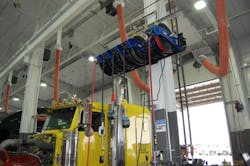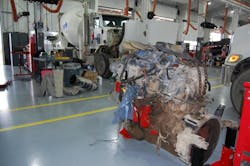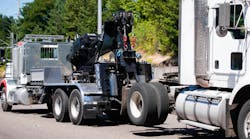With the first licensing date for the new PC-11 truck engine oil standard less than a year away – officially Dec. 1, 2016 – an “all hands on deck” effort is shaping up in the words of Shawn Whitacre, senior staff engineer of engine oil technology at Chevron Lubricants, to square away key specification details, such as “backwards compatibility.”
“There’s recognition, as a practicality, to have some backward compatibility, but how far back? To 2010 [model] engines? We honestly don’t know yet,” he told Fleet Owner. “No OEM has formally approved backward compatibility yet, but that should become somewhat clearer over the next six months.”
Whitacre, who also serves as chairman of the ASTM [American Society for Testing and Materials] heavy-duty engine oil classification panel tasked with the final development of PC-11 oil requirements, stressed that only one of the two PC-11 blends being developed – CK-4 – will be backwards compatible in that “formal “sense.
“CK-4 will be able to claim compatibility with older 15W-40 specifications in terms of viscosity,” he explained.
The question is to what extent OEMs will allow the new lower viscosity CK-4 oil – a 10W-30 blend – to be used.
“The rule of thumb is that most 2010 engines and up should allow for it,” Whitacre noted. “But pre-2010 engines will only allow for a much smaller substrate of that oil to be used.”He added that CK-4 builds on the prior CJ-4 category, offering improved oxidation stability but in the same viscosity grades end users are used to today. Thus he expects CK-4 oils to be approved for use in many of the same engines and applications that currently recommend CJ-4.
The second PC-11 oil blend, however – FA-4 – is of a thinner viscosity than CK-4 and won’t be as backwards compatible.
“FA-4 will be at a lower viscosity level than today’s oils, offering more optimized fuel economy for engines that are designed to use these thinner oils,” Whitacre noted. “Like with other low viscosity oils, we don’t expect that engine makers will allow these oils across the board.”
He said it seems that OEMs are still working on their own engine test programs at this point to determine to what extent the new FA-4 oils can be recommended – if at all.
“This is something that we’ll be watching closely in the coming months, as these positions become clearer,” Whitacre pointed out.“You must understand it’s not just about the thinness of the oil. Engine components themselves are being redesigned as well; part of this effort to gain more fuel economy,” he added, as such fuel economy improvements are being dictated by Phase II greenhouse gas (GHG) emission rules promulgated by the Environmental Protection Agency (EPA) and the National Highway Traffic Safety Administration (NHTSA) in June of last year.
“Fuel economy is partly dictated by the internal friction of engine components and the energy needed to push oil around within it,” Whitacre said.
Thus by lower the viscosity of the oil – making it “thinner” – reduces internal engine friction and lessens the amount of energy it needs to operate, resulting in fuel savings, he emphasized.
Whitacre stressed, however, that the protective properties of the oil are not lessened by moving to a thinner viscosity.
Yet engines do need to be designed to operate with such thinner oils – especially the FA-4 blend – which is why the new PC-11 oils may not meet all the lubricant specs established for some older engine models.
A few other items Whitacre mentioned as the development of PC-11 oils enters its final stage:
- The American Petroleum Institute (API) will allow oils to be marketed with CK-4 or FA-4 “in the donut” starting on December 1, 2016.
- Now that the “rules of the game” are officially established, the lubrication industry effectively goes into a commercialization phase for CK-4 and FA-4. “This is when oil companies and our additive suppliers complete the final engine and bench test programs to evaluate the new oils against these more stringent requirements,” he said.
- Once the new “recipes” for CK-4 and FA-4 blends are finalized, lubricant production facilities will prepare to make the new products. “We’ll work on necessary revisions to product packaging and sales support materials, and other safety and regulatory compliance aspects associated with introducing a new product,” he noted.
- Both PC-11 oils will be formulated to be more resistant to oxidation, meaning that they can stand up to elevated temperature for longer periods of time without breaking down. “This is something that engine makers identified as a priority because of the greater demands that new engines are placing on the oil and because engine makers continue to push for longer oil change intervals,” Whitacre explained.





